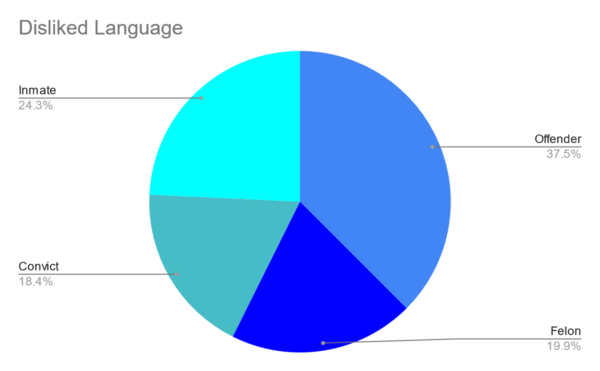By the numbers: “Second chance mentality: first chance reality” wrap-up
The “Second Chance Mentality: First Chance Reality” series, facilitated by JSTOR Access in Prison, provided a platform for voices from those with incarceration histories to be heard. Special thanks are extended to Terrell Blount of the Formerly Incarcerated College Graduate Network, Shannon Ross of The Community, JoyBelle Phelan of Unbound Authors, and Freedom Education Project Puget Sound for their essential roles in steering this initiative throughout April 2024.
Of the 199 essays received—161 emailed, 21 typewritten, and others submitted by hand—141 were from men and 58 from women. The themes woven through these narratives range broadly from employment and housing to family and personal safety and there were clear gender differences. Notably, 42 of the essays from women mentioned domestic violence, compared to just 19 from men. Men frequently discussed employment and reentry, while women focused intensely on personal safety, housing, family relationships, and managing child-related responsibilities. Both groups emphasized the importance of education and reentry preparation, and their accountability for their actions.
These narratives of personal experiences expose the societal barriers that magnify reentry anxieties. Stigmas linked to past convictions severely restrict access to essential resources like housing, employment, and education, complicating societal reintegration. Additionally, the need for gender-specific support services was highlighted, catering to the unique needs of women and those sentenced as juveniles, many of whom have survived domestic violence.

About chances
A deeper contemplation of the word “chance” is important. Historically, “chance” connotes randomness and the unpredictability of events, often outside of human control. However, when discussing “second chances” in the context of reentry, we are urged to consider how the concept of “chance” interacts with systems that engineer probabilities of success post-release. Instead of relying on the whims of chance, these essays suggest more deliberate acts of inclusion and support would promote fairness and equity.
The distribution of opportunity should be strategically designed to address individual circumstances and overcome structural barriers. Our commitment to turning “second chance” from a concept into a reality involves recognizing that reintegration needs are as diverse as the individuals themselves, and the paths to success must be tailored accordingly. Reconsidering the essays with this in mind emphasizes how the writers are, first and foremost, people who are struggling not to be defined by a circumstance.
Language of incarceration
Respondents who addressed how they would like to be identified didn’t like being called inmates, convicts, offenders, or criminals, but they used that language whenever referring to people in custody. Despite their disdain for the language, they used it themselves. Many are insulated from the wider discussions surrounding the language of incarceration, and replicated what they already knew – suggesting that any adopted terminology will be imposed rather than grassroots-driven. Second, when they stated a preference, most just wanted to be called by their own name.

Education alone won’t fix this
In the future, with more people having access to education while incarcerated, it will be interesting to see how their concerns evolve. Will the effort of putting in the work to obtain higher education in prison result in more people with lived carceral experience obtaining a foothold in the middle class? Many obtaining an education while in prison are worried about the limitations a conviction will impose on their career prospects. Their anxieties are the reality of people with conviction histories pursuing careers in their field of choice, stymied by legacy rules, background checks, and perceptions about who is eligible for promotions. This series has been a vivid reminder of the resilience within the incarcerated community and the urgent need for opportunities to match educational attainment. Let’s continue to support initiatives that provide real, equitable opportunities, grounded not in the randomness of “chance.”
